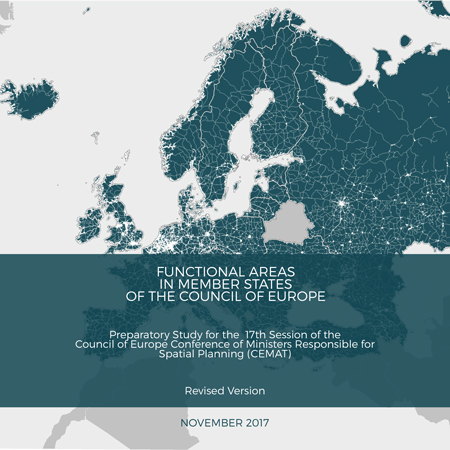Council of Europe Conference of Ministers in Charge of Spatial Planning CEMAT. 17th session.

Council of Europe Conference of Ministers in Charge of Spatial Planning CEMAT. 17th session.
Bucarest, 3-4 November 2017
Report by Luc-Emile BOUCHE-FLORIN
ECTP-CEU Honorary President and Official representative
I- CEMAT Conference of ministers in Charge of Spatial Planning; meeting of the senior officials for the preparation of the session.
As I announced during the Paris ECTP-CEU GA last June, the Romanian government, faithful to its commitment of Napflion, decided to organize the 17th session of the CEMAT conference. A first meeting was held in Bucharest on the 20th of May 2017. The purpose of this first meeting was to discuss the topic of the session. The aim is to explore the concept of ‘functional area’ for European territories and related new models of governance.
A European study was commissioned by the Romanian government based on a questionnaire submitted to the 47 COE member states. The result of the study supported the reflection and served as a basis for the drafting of the declaration submitted to the ministers for approval.
A second meeting took place end of September 2017 to work on the draft declarations followed by several Email exchanges. A last senior official meeting took place the on the 2nd of November in Bucarest to integrate the last modifications and comments and finalize the declarations.
Two declarations were finalized for the approval:
- Resolution N°1 on Functional areas – Capitalisation of local potential in territorial development policies over the European Continent.
- Resolution N°2 on the future of the CEMAT.
II- CEMAT, 17th Session of the Conference of Ministers in Charge of Spatial Planning.
The official session studied and approved the two resolutions.
- Resolution N°1: Functional areas
Functional areas represent either territories that aggregate around urban centres and concentrate systemic relationships, or types of areas delineated according to geographic specificities or in relation to economic activities. These areas can be regarded as instruments that facilitate the establishment of functional relationships between different types of territories that transcend administrative borders.
Functional spatial planning acts in line with improved multi-level collaboration, improved cross-sectoral cooperation, increased mobilization and participation of relevant actors, strengthened ability to anticipate and act innovatively to external changes, increased knowledge of and ability to identify and act based on site-specific conditions.
The participants pointed out that functional areas are of prime importance to provide a sound and fair governance based on local democracy and public participation.
- Resolution N°2; Future of the CEMAT.
The CEMAT represents the only pan-European framework for cooperation on spatial planning and functions as a platform for discussion and exchange of best practices between Council of Europe Member States on spatial development policies. The CEMAT work is focusing on the exercise of human rights and democracy on European territories with a specific focus on good governance and public involvement.
All the delegations present and represented have shown their clear desire to continue the work of the CEMAT. I was asked by the Romanian government to introduce the 2nd declaration. More than a presentation, my speech was a plea for the importance of the CEMAT.
The COE secretariat, although recognizing the value of CEMAT work, made it clear that there was no longer a budget for ministerial conferences activities and that in the case of CEMAT, it was appropriate for member and sovereign states to organize themselves in particular in financial matters. The Croatian delegation expresses the interest of its country to take the lead but is still waiting for a formal approval from its Government. Germany, Russia and others asked if Romania could kindly keep the presidency until we find the next presidency; this was accepted by Romania.
Versailles, October 6th, 2017
Other links & papers:
Resolution N°2 on the future of the CEMAT